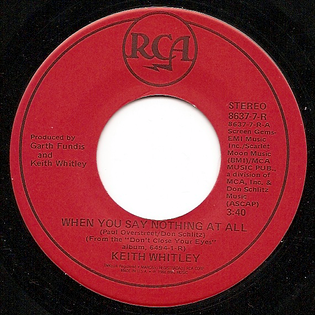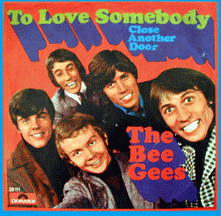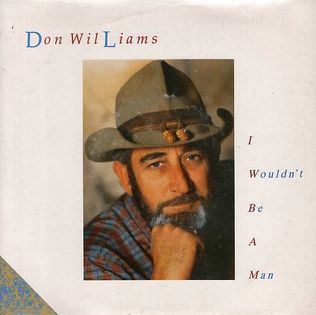"Poor Poor Pitiful Me" is a rock song written and first recorded by American musician Warren Zevon in 1976.

"What Made You Say That" is the debut single by Canadian country music artist Shania Twain. The song was released on March 6, 1993, as the lead single to her eponymous debut album (1993). The song was written by Tony Haselden and Stan Munsey Jr. and produced by Harold Shedd and Norro Wilson, who also produced her album. The song was initially recorded by American country singer and actor Wayne Massey for his third and final studio album Wayne Massey and Black Hawk (1989).

"When You Say Nothing at All" is a country song written by Paul Overstreet and Don Schlitz. It was a hit song for four different performers: Keith Whitley, who took it to the top of the Billboard Hot Country Singles chart on December 24, 1988; Alison Krauss & Union Station, whose version was their first solo top-10 country hit in 1995; Irish singer Frances Black, whose 1996 version became her third Irish top-10 single and brought the song to the attention of Irish pop singer Ronan Keating, whose 1999 version was his first solo single and a number-one hit in the United Kingdom, Ireland, and New Zealand.
"Pink Cadillac" is a song by Bruce Springsteen released as the non-album B-side of "Dancing in the Dark" in 1984. The song received much airplay worldwide and appeared on the Billboard Top Tracks chart for 14 weeks, peaking at No. 27. The song was also a prominent concert number during Springsteen's Born in the U.S.A. Tour.

Alright Guy is the fourth studio album by American country music singer Gary Allan. It was released in October 2001 via MCA Records Nashville. It produced three singles. The album's first single, "Man of Me", reached number 18 on the US Billboard Hot Country Songs charts. The second single, "The One", became Allan's second Top 5 hit with a peak at number 3. The third and final single, "Man to Man", became Allan's first number one hit. Like his previous album, Smoke Rings in the Dark (1999), Alright Guy was also certified platinum by the RIAA.

"Fever" is a song by American hard rock band Aerosmith. It is from the band's massively successful 1993 album Get a Grip. It was written by Steven Tyler and Joe Perry and is the only Tyler/Perry song on Get a Grip written without the aid of "song doctors". The song is the fourth track on Get a Grip, running four minutes and 15 seconds. The song reached #5 on the Billboard Mainstream Rock Tracks chart and is one of seven tracks from Get a Grip to make a chart appearance on any chart.

"To Love Somebody" is a song written by Barry and Robin Gibb. Produced by Robert Stigwood, it was the second single released by the Bee Gees from their international debut album, Bee Gees 1st, in 1967. The single reached No. 17 in the United States and No. 41 in the United Kingdom. The song's B-side was "Close Another Door". The single was reissued in 1980 on RSO Records with "How Can You Mend a Broken Heart" as its flipside. The song ranked at number 94 on NME magazine's "100 Best Tracks of the Sixties". It was a minor hit in the UK and France. It reached the top 20 in the US. It reached the top 10 in Canada.

"Home" is a song written and recorded by American country music artist Alan Jackson. The song was originally recorded for his 1990 debut album Here in the Real World. The original 1989 recording served as the B-side to three of Jackson's singles: his debut single "Blue Blooded Woman", as well as his first two Number One hits "I'd Love You All Over Again" and "Don't Rock the Jukebox."
"A Woman in Love" is a song written by Curtis Wright and Doug Millett, and recorded by American country music singer Ronnie Milsap. It was released in September 1989 as the third single from the album Stranger Things Have Happened. It was his last song to reach number one on the U.S. country singles chart.

"Third Rate Romance" is a song written by Russell Smith, first recorded in Montreal in 1974 by Jesse Winchester and his band the Rhythm Aces, assisted by Smith. It became a hit the following year by the newly re-formed Amazing Rhythm Aces on its 1975 album Stacked Deck. It was the band's debut single, reaching No.11 on the U.S. country singles chart and No.14 on the Billboard Hot 100, as well as No.1 on the Canadian RPM Country Tracks and Top Singles charts.
"Love Out Loud" is a song written by Thom Schuyler, and recorded by American country music artist Earl Thomas Conley. It was released in March 1989 as the fourth single from the album The Heart of It All. The song was Conley's eighteenth and final number one on the country chart as a solo artist. The single went to number one for one week and spent fifteen weeks on the country chart.

"What She Is (Is a Woman in Love)" is a song written by Bob McDill and Paul Harrison and recorded by American country music artist Earl Thomas Conley. It was released in February 1988 as the lead single from the album The Heart of It All. The song Conley's fifteenth number one on the country chart. The single went to number one for one week and spent a total of thirteen weeks on the country chart.
"We Believe in Happy Endings" is a song written by Bob McDill and recorded by American country music artist Johnny Rodriguez. It was released in September 1978 as the second single from the album Just for You. The single went to number seven on the Billboard Hot Country Singles & Tracks chart.
"This Night Won't Last Forever" is a song written by Bill LaBounty and Roy Freeland, and originally recorded by LaBounty in 1978, whose version of the song was a minor Adult Contemporary and pop hit, reaching number 65 on the Billboard Hot 100.

"She Dreams" is a song co-written by Tim Mensy and Gary Harrison. It was originally recorded by Mensy for his 1993 album This Ol' Heart, from which it was released as the third and final single. It was also the final single release of his career. It was recorded by American country music artist Mark Chesnutt and released in July 1994 as the lead single from the album, What a Way to Live. It peaked at number 6 on the U.S. Billboard Hot Country Singles & Tracks chart and at number 7 on the Canadian RPM Country Tracks chart.
"Brotherly Love" is a song written by Jimmy Alan Stewart and Tim Nichols, which has been recorded by Moe Bandy, as well as a duet between Keith Whitley and Earl Thomas Conley.
"Shadow of a Doubt" is a song written by Tom Wopat and Robert Byrne, and recorded by American country music artist Earl Thomas Conley. It was released in May 1991 as the first single from the album Yours Truly. The song reached number 8 on the Billboard Hot Country Singles & Tracks chart.

"I Wouldn't Be a Man" is a song written by Mike Reid and Rory Bourke. Originally recorded by Don Williams, it has also been covered by Billy Dean and Josh Turner. Williams's version of the song was a Top Ten country hit in late 1987–early 1988, while versions by Dean and Turner also charted.
"Rose Garden" is a song written in 1967 by American singer-songwriter Joe South. It was first recorded by Billy Joe Royal on his 1967 studio album Billy Joe Royal Featuring "Hush". Versions by South himself and Dobie Gray appeared shortly after the original. Gray's version became a minor hit in North America in 1969.
"Bring Back Your Love to Me" is a song written and recorded by John Hiatt for his 1990 studio album Stolen Moments. The song was also recorded in 1990 by American country music artist Earl Thomas Conley and released as the first single from his Greatest Hits, Volume II compilation album. The song reached number 11 on the Billboard Hot Country Singles & Tracks chart in May 1990.








